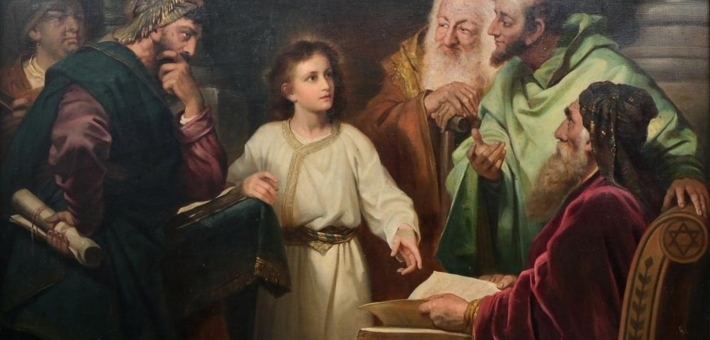Commentary on Psalm 148
Christmas Day and the few days afterward, at least in my North American context, are often a time to focus on ourselves, our own wants and desires, our wish lists, our ability––or lack thereof––to manage the complex expectations of this time of year, our own feelings of loss and sadness. We often need to decompress on these days, take a bit of time off, and try to relax before gearing up for a new year when we return to the world full of––we hope––new energy and high spirits, and so on. We circle around the fire, we hope to unplug from our email, and the worries of the world, and—at least in our ideal version of the holidays—melt away for a few days.
This can be mirrored in our Christmas celebrations: We imagine a small stable, a tiny new family, alone in the cold save a few animals, appreciating the miracle of new life at the edge of the waning old year. But this insular, self-reflective, Victorian-style, cute and inwardly focused Christmas message is starkly at odds with the proclamations that ring out in Matthew and Luke, the gospels that mention the birth narrative: Jesus is the savior of the world, peace on earth, the one who redeems all the people, who gives light to all who sit in darkness––good news of great joy for all the people (Luke 2:10–11). We don’t need to give up the Scandinavian idea of coziness, hygge. But Psalm 148 can remind us about the mind-blowing implications of Jesus’ birth.
In material terms, the descriptions of Jesus’ birth are humble and lonely––a small, poor family alone in what was basically an ancient garage––but in the words of these storytellers, the significance is cosmic. All people, and all of time and space, are wrapped up in this joyful celebration that commemorates the moment the Creator became the creation. As Ian McFarland writes:
In [the act of] creation, God through the Word determines that the gift of being should not be reserved to God alone, and in taking flesh God, again through the Word, determines that this gift should be enhanced to allow creatures to share in God’s very own life. God intends not simply that other entities should exist, but that they should exist in God.1
Christmas, in other words, marks the moment that the cosmos suddenly found itself enhanced: All at once, things didn’t just exist––they now existed in God, since God was now fully and definitively a part of the material cosmos itself. Seen in these terms, the cosmic jubilation described in Psalm 148 shares a lot in common with the Christmas spirit found in the gospels: The ocean and the heavens aren’t lounging in their cozy jammies on Christmas morning. They’re dancing in rapture! We all find ourselves face-to-face with the indescribable beauty and wonder that created the cosmos, who has come in love to know us and to be known by us.
The psalm opens and closes with the resounding call “Hallelujah,” literally “Praise Yah[weh]” (148:1, 14). This inclusio sets the tone for a psalm that uses the imperative form of the Hebrew verb hallel repeatedly. As one of the five “Hallel” songs (Psalms 146–150), this poem does its part to direct us to praise as we close out the Psalter: It tells us to praise no fewer than 12 times. This repetition creates a sense of urgency in its call for literally everything to join in wild, unselfconscious adoration of the Creator. This is no gentle lullaby sung over a manger; it’s an anthem proclaiming that the king has come.
The structure of Psalm 148 clearly mirrors the creation account in Genesis 1: It begins with a call for all to praise YHWH, starting with the heavens above the earth (verses 1–6), then shifting to the earth and all that lives on it (verses 7–14). The psalm moves from the highest imaginable objects in the universe to the lowest in a deliberate arc that demonstrates the structure and order of the cosmos: heavens, then angels, then hosts (ṣabaot, referring to the divine armies that follow YHWH’s command), then sun, moon, and stars, and then the blue sky, or the “waters above the heavens” (verses 1–4).
By calling these often-deified celestial bodies to praise YHWH, the psalmist subtly affirms the sole God’s supremacy over all cosmic powers, echoing the cosmic significance of Christ’s birth proclaimed in the gospels. These massive and awesome objects and beings were created by the divine command (ṣivvah), recalling both the creation by word in Genesis 1 and the commandments in the Torah that structured the community of Israel in Exodus 20–24 and Deuteronomy 12–26. God’s decree that established the cosmos will never falter: The reliability of God is witnessed in the clockwork movement of the celestial bodies, whose very movements are their praise to the Creator (verses 5–6).
Shifting to earth, the psalm calls on a diverse array of created beings to join the chorus (verses 7–10). Again, the list starts with the loftiest things, at least in symbolic terms, starting with the great chaotic sea monsters (verse 7), then moving to atmospheric phenomena like lightning and hail (verse 8), then to mountains and hills (verse 8), and then to the tall trees, large animals and birds, and even lowly creeping things (verses 9–10).
From sea monsters (tannînim, see Genesis 1:21; Job 41) to the deep (tehôm, see Genesis 1:2), from fire and hail to snow and frost, the psalmist leaves no part of creation exempt from the obligation to praise. Even elements associated with divine judgment, like the “stormy wind” (verse 8; see also Jonah 1), are included, suggesting that all natural phenomena, however fearsome, serve God’s purposes. This includes the chaos monsters, the tannînim, like Leviathan: God’s world includes chaos, but as God says in Job 38:8–11, the chaotic sea is God’s child as much as anything else, yet God has prescribed limits to it, and chaos operates within the boundaries of the divine order (see also Psalm 148:6).
Finally, the song ends by focusing on the small, earthbound creatures known as the humans (verses 11–14). The list starts with the “highest” of the mortals, the kings and rulers, moving to vigorous young people, and then ending with vulnerable children and elderly people (verses 11–12). All people, no matter their status or background or ethnicity or religious identity, are called to participate in the enormous shout of joy rippling through the cosmos (“all peoples,” verse 11). This reminds us of the message of Jesus’ salvation: He first appeared as a vulnerable child to marginal people, but was praised by a group of highly educated elite from a distant land and soon evinced the jealousy of even a king (Matthew 2:1–12).
The reason for the praise in Psalm 148 is left for the end: YHWH has “raised up a horn for his people,” a phrase quoted verbatim by Mary in the Magnificat (Luke 1:69). To “exalt” or “raise up a horn” was a symbol of victory, as horns were a potent symbol of power, and even divinity, in the ancient world (see Psalm 18:2; 89:24; 92:10; 112:10; Ezekiel 29:21; Micah 4:13; Deuteronomy 33:17). In the Psalms, the image of the divine “horn” also references the nascent idea of an anointed leader who would rebuild the line of David and restore the people to a place of flourishing (Psalm 132:17).
Psalm 148 was clearly written quite late: It directly references several later biblical texts, such as Genesis 1. It is very possible that Psalm 148 participated in the early shift toward a “messianic” interpretation of the long-awaited resumption of the line of David––and in this way, would have been on the minds of those anticipating the coming of the Messiah, such as Anna and Simeon (Luke 2:25–38).
For preachers addressing this text on the First Sunday after Christmas, the psalm reminds us that Christ’s incarnation is not just for humanity, but for all creation. It invites us to expand our vision of redemption beyond the confines of our immediate social circles and cozy traditions.
In a world often marked by chaos and suffering, Psalm 148 offers unrestrained praise––itself an act of resistance against despair. It calls us to look beyond our narrow, self-centered concerns and recognize our place within a vast cosmos radiating with endless praise.
Notes
- Ian McFarlan, The Word Made Flesh: A Theology of the Incarnation (Louisville: Westminster John Knox, 2019), 75.


December 29, 2024